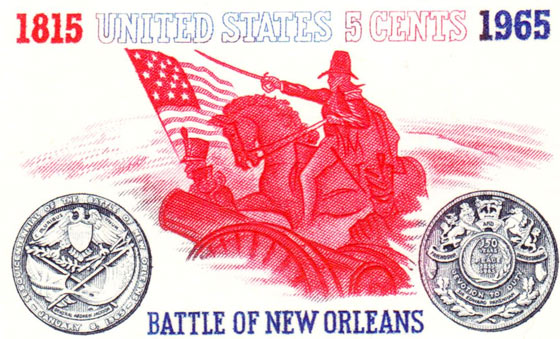Impressment
After the resumption of war between France and Great Britain, British ships frequently harassed American trade vessels in the Atlantic. Not only did the harassment disrupt America’s international trade, but it also resulted in the impressment of American sailors. Because of desertions in the Royal (British) Navy, British naval forces had to recover their losses. As a result, they forced Americans to serve in their navy. They justified impressment by claiming that because American sailors were once British, they were always British.
Jefferson's Useless Acts
On June 22, 1807, the British frigate Leopard stopped the U.S. frigate Chesapeake off the coast of Virginia and demanded permission to search the ship for British deserters. When their demand was refused, the British attacked the American ship killing three sailors and wounding 18 more. After the attack, British naval forces announced their intention to search all American vessels. In response, Congress passed the Embargo Act of 1807 which put a complete stop to all foreign exports, and which virtually stopped all imports. The point of the Embargo Act was to punish the British and French until they began to respect the authority of the American nation. In actuality, however, American merchants were punished because they were prohibited from exporting. In 1809, Jefferson signed the Non-Intercourse Act which repealed the Embargo Act and opened foreign trade to all countries except France and Great Britain. The Non-Intercourse Act proved impossible to enforce, and was replaced with Macon's Bill Number 2 by Congress in 1810. Macon's Bill Number 2 allowed for the resumption of trade with all nations including Great Britain and France.
Siding with France This Time
Napoleon I of France indicated he would respect U.S. neutrality in the war between England and France, if the U.S. reimposed non-intercourse with England. The U.S. president at the time, James Madison agreed, and subsequently suspended trade with England. Pressured by Henry Clay, John C. Calhoun and others, Madison called up 100,000 militiamen for six months service for the purposes of declaring war on England.
Fighting Begins
Despite poor preparations, weak military units, a central government that was not taken seriously in the northeast, and opposition from the Federalist Party, the war commenced. It started off poorly as U.S. forces were routed in several attempts to invade English strongholds in Canada. Furthermore, British Naval forces had staged a powerful naval blockade along much of America's Atlantic coast which prevented any imports or exports. On August 19, 1812, British forces and their allied Indians invaded and took Detroit, Michigan. U.S. Naval forces did manage a victory against British forces off the coast of Nova Scotia. Nevertheless, the blockade remained in place.
American Victories at Lake Erie and Tippecanoe
On September 10, 1813, American Naval forces under General Oliver Hazard Perry won a major victory over British forces at Lake Erie on Pennsylvania's coastline. Because the American victory closed off British navigation of Lake Erie, British forces evacuated Detroit. The retreating British and Indian forces were subsequently engaged at the Battle of Thames River in Upper Canada, where Shawnee chief Tecumseh was killed and the British lost control of southwestern Ontario.
 |
| William Henry Harrison |
The Burning of Washington
Despite the mounting American victories, English forces had defeated France in Europe. The British victory made available large numbers of troops and supplies which were sent to America in 1814. Nevertheless, setbacks continued to plague the British. Their southern campaign was thwarted by Andrew Jackson’s bloody victory over Creek Indians at Horseshoe Bend, Alabama and set the stage for a massive battle at New Orleans. In August of 1814, however, substantial British forces sailed through the Chesapeake Bay and landed in Maryland. British forces routed American resistance at Bladensburg, Maryland, and quickly took the American capital - Washington. On August 24-25, British forces burned Washington to the ground. Despite the bombardment of Baltimore, Maryland, which resulted in Francis Scott Key authoring the Star Spangled Banner, American forces resisted. On September 11, 1814, American forces defeated the British at Lake Champlain and thwarted a large-scale British invasion from Canada.
The British Abandon the War
After the defeat at Lake Champlain, and because American trade with a defeated France was no longer an issue, Royal authorities decided to abandon the war in America. On December 14, 1814, America and England signed the Treaty of Ghent which ended the war and called for the abandonment of British forts along its northwestern frontier.
Jackson's Monumental Victory at New Orleans
Despite the Treaty of Ghent, word of the war’s end failed to reach all areas. General Andrew Jackson, a band of pirates, and several armies of free black men, Kentucky militia, and Louisiana militia defeated the much larger British forces at the Battle of New Orleans. At the end of the battle, American casualties numbered 71, while British casualties exceeded 2,000. Despite the fact that the war was over, if New Orleans had not have fallen into America’s hands, England would not have honored the Treaty of Ghent, and would not have surrendered New Orleans.
